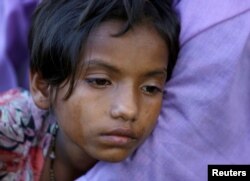Myanmar's de facto leader Aung San Suu Kyi expressed hope Tuesday for reaching an agreement with Bangladesh on the return of Rohingya Muslims who have fled to Bangladesh in the past three months.
More than 600,000 Rohingya Muslims have left Myanmar’s Rakhine State since August 25, after insurgents attacked security forces and prompted a brutal military crackdown that has been described as ethnic cleansing.
Aung San Suu Kyi said the neighboring countries are working on a memorandum of understanding for the "safe and voluntary return" for those who fled.
"Nothing can be done overnight, but we believe that we will be able to make steady progress," she said.
Also Tuesday, rights group Amnesty International issued a new report saying the government in Myanmar discriminates and segregates Rohingya and other Muslims communities.
"In the case of the Rohingya this is so severe that it amounts to a widespread and systemic attack on a civilian population, which is clearly linked to their ethnic (or racial) identity, and therefore legally constitutes apartheid, a crime against humanity under international law," Amnesty said.
The group called on Myanmar to institute an action plan to combat discrimination, to reform discriminatory laws and policies and to make sure that those responsible for crimes against humanity are held accountable.
"We're calling for an arms embargo and targeted sanctions against officials responsible for this system, but we're also insisting that any development aid provided by the international community must be conditioned on the principle of non-discrimination, because otherwise it risks perpetuating this already atrocious situation," said Amnesty International Senior Director of Research Anna Neistat.
Myanmar’s government has repeatedly rejected claims that atrocities, including rape and extrajudicial killings, are occurring in northern Rakhine, the epicenter of the violence that the United Nations has qualified as "textbook ethnic cleansing."
Myanmar does not recognize the Rohingya and denies them citizenship, referring to them as “Bengali” to imply origins in Bangladesh.






